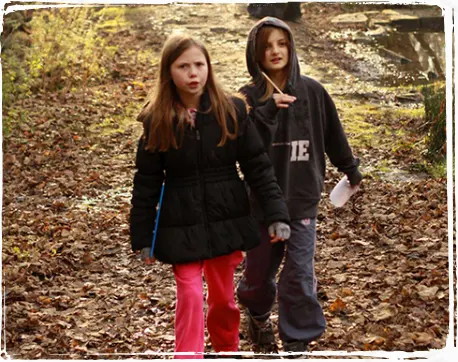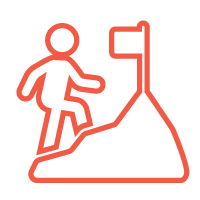finding hidden treasure
Exploring the natural wonders of the woodland, students will connect with nature, their classmates, and their senses.
Our woodland sessions can include a whole range of activity from bushcraft skills building shelters & lighting fires to exploring & understanding habitats, creating natural art, exploring streams, local historic sites and much more
Get in touch to shape your woodland adventure.
What’s Included
Students are provided with the following equipment, as and when appropriate.

All specialist equipment
Maps.
All specialist clothing
Waterproofs and wellies when required. Ideally students should bring their own wellies, but we have plenty on hand to lend.
Transport
Once at the centre, all transport to and from adventure activities is provided.
Experienced, full-time, outdoor teachers and tutors
Each group of 12 students is led by a fully qualified and experienced outdoor tutor.
– back in the classroom –
curriculum links
The woods is an excellent to get up close and engage with some curriculum areas in the real environment whether it is looking for mini beasts in their habitats, using maps to navigate through the maze of trees or quietly listening and enjoying the sounds of the woods or a bit of birdsong. Seeing these areas in action can hugely help learners to engage.
Key Stage 2
Science: Living things and their habitats
Woodland adventurers have the opportunity to identify creatures – those they can see and those they can’t. They will learn about identifying their tracks and their burrows, and the importance of being careful and protecting their habitat.
Art
Art is in abundance in nature. Time can be taken to admire naturally occurring art such as tree formations, patterns in leaves, spider webs …the possibilities go on. Students can then be inspired to create their own artwork using natural materials found around them.
Music
Students are encouraged to stop and take some time to quietly listen to the noises around them. Tuning into their sense of sound, students will become aware of the birdsong that surrounds them and with a little patience and curiosity, they can learn to single out and identify birds based on the sounds they make.
Key Stage 3
Science - Ecosystems
Students can learn all about the life around them, how it is connected and the fine balance of this. Species can be identified and Interactions between parts of the ecosystem can be explored such as how micro organisms have the important role of decomposing leaf matter.
Geography - Maps
Learners can be introduced to Ordinance Survey maps, their key features, scales and uses. They can then be taught how to start using these as an important tool in navigation and identifying the surrounding area to them.
English - Arguments
In groups, arguments can be formed around parts of the woodland, discussing how it used to be and how it currently is. Groups can put their argument forward using their knowledge, experience and history skills.
LOCATIONS: Offered at both Bewerley Park and East Barnby
YEAR GROUPS: Suitable for Primary School students

DURATION: Available as a full or half day activity

DIFFICULTY: Adapted to the age and level of experience of students on adventure
MIN GROUP SIZE: 12 Students
finding hidden treasure
Exploring the natural wonders of the woodland, students will connect with nature, their classmates, and their senses, as they search for hidden treasures.
Treasure hunters will explore woodlands in the Yorkshire Dales and North York Moors National Parks, and the level of difficulty of the hunt is based on the age and ability of students on adventure.
What’s Included?
Maps
All specialist clothing
Waterproofs and wellies when required. Ideally students should bring their own wellies, but we have plenty on hand to lend.
Transport
Once at the centre, all transport to and from adventure activities is provided.
Experienced, full-time, outdoor teachers and tutors
Each group of 12 students is led by a fully qualified and experienced outdoor tutor.
classroom benefits
curriculum links
The woods is an excellent to get up close and engage with some curriculum areas in the real environment whether it is looking for mini beasts in their habitats, using maps to navigate through the maze of trees or quietly listening and enjoying the sounds of the woods or a bit of birdsong. Seeing these areas in action can hugely help learners to engage.
Key Stage 2
Science: Living things and their habitats
Woodland adventurers have the opportunity to identify creatures – those they can see and those they can’t. They will learn about identifying their tracks and their burrows, and the importance of being careful and protecting their habitat.
Art
Art is in abundance in nature. Time can be taken to admire naturally occurring art such as tree formations, patterns in leaves, spider webs …the possibilities go on. Students can then be inspired to create their own artwork using natural materials found around them.
Music: Birdsong
Students are encouraged to stop and take some time to quietly listen to the noises around them. Tuning into their sense of sound, students will become aware of the birdsong that surrounds them and with a little patience and curiosity, they can learn to single out and identify birds based on the sounds they make.
Science - Ecosystems
Students can learn all about the life around them, how it is connected and the fine balance of this. Species can be identified and Interactions between parts of the ecosystem can be explored such as how micro organisms have the important role of decomposing leaf matter.
Geography - Maps
Learners can be introduced to Ordinance Survey maps, their key features, scales and uses. They can then be taught how to start using these as an important tool in navigation and identifying the surrounding area to them.
English - Arguments
In groups, arguments can be formed around parts of the woodland, discussing how it used to be and how it currently is. Groups can put their argument forward using their knowledge, experience and history skills.